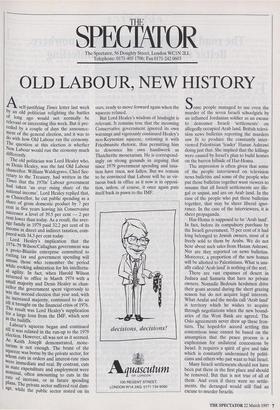SPECTATOR
The Spectator, 56 Doughty Street, London WC1N 2LL Telephone: 0171-405 1706; Fax 0171-242 0603
OLD LABOUR, NEW HISTORY
Aself-justifying Times letter last week by an old politician refighting the battles of long ago would not normally be relevant or interesting this week. But it pre- ceded by a couple of days the announce- ment of the general election, and it was to do with how Old Labour ran the economy. The question at this election is whether New Labour would run the economy much differently. The old politician was Lord Healey who, as Denis Healey, was the last Old Labour chancellor. William Waldegrave, Chief Sec- reta'..., y to the Treasury, had written in the Times that the 1970s' Labour government had taken 'an ever rising share of the national income'. Lord Healey replied that, as Chancellor, he cut public spending as a share of gross domestic product by 7 per cent in five years leaving his Conservative successor a level of 39.5 per cent — 2 per cent lower than today. As a result, the aver- age family in 1979 paid 32.2 per cent of its income in direct and indirect taxation, com- pared with 34.3 per cent today. Lord Healey's implication that the 1974-79 Wilson/Callaghan government was a proto-Blairite enterprise committed to cutting tax and government spending will amuse those who remember the period while evoking admiration for his intellectu- al agility. In fact, when Harold Wilson returned to office in March 1974 with a small majority and Denis Healey as chan- cellor the government spent vigorously to win the second election that year and, with increased ncreased majority, continued to do so till brought on the financial crisis of 1976. The result was Lord Healey's supplication for a large loan from the IMF, which sent in the bailiffs. Labour's squeeze began and continued till it was relaxed in the run-up to the 1979 election. However, all was not as it seemed. As Keith Joseph demonstrated, mone- tarism is not enough. The brunt of the squeeze was borne by the private sector, for Whom cuts in orders and interest-rate rises w ere immediate and real. By contrast, cuts in state expenditure and employment were nominal, often amounting to cuts in the rate of increase, or in future spending plans. The private sector suffered real dam- age, while the public sector rested on its oars, ready to move forward again when the squeeze relaxed. But Lord Healey's wisdom of hindsight is relevant. It remains true that the incoming Conservative government ignored its own warnings and vigorously continued Healey's neo-Keynesian squeeze, rationing it with Friedmanite rhetoric, thus permitting him to denounce his own handiwork as Thatcherite monetarism. He is correspond- ingly on strong grounds in arguing that since 1979 government spending and taxa- tion have risen, not fallen. But we remain to be convinced that Labour will be as vir- tuous back in office as it now is in opposi- tion, unless, of course, it once again puts itself back in pawn to the IMF. Some people managed to use even the murder of the seven Israeli schoolgirls by an inflamed Jordanian soldier as an excuse to denounce Israeli 'settlements' on allegedly occupied Arab land. British televi- sion news bulletins reporting the murders saw fit to produce the constantly inter- viewed Palestinian 'leader' Hanan Ashrawi doing just that. She implied that the killings were caused by Israel's plan to build homes on the barren hillside of Har-Homa.
The impression is often given that some of the people interviewed on television news bulletins and some of the people who put those bulletins together want viewers to assume that all Israeli settlements are ille- gal or unjust, and are on Arab land. In the case of the people who put these bulletins together, that may be sheer liberal igno- rance. In the case of the interviewees, it is sheer propaganda.
Har-Homa is supposed to be 'Arab land'. In fact, before its compulsory purchase by the Israeli government, 75 per cent of it had long belonged to Jewish owners, most of it freely sold to them by Arabs. We do not hear about such sales from Hanan Ashrawi. Nor are they reported on news bulletins. Moreover, a proportion of the new homes will be allotted to Palestinians. What is usu- ally called 'Arab land' is nothing of the sort.
There are vast expanses of desert in Judaea and Samaria that have no private owners. Nomadic Bedouin herdsmen drive their goats around during the short grazing season but do not acquire legal interests.
What Arafat and the media call 'Arab land' is territory which he wishes to acquire through negotiations when the new bound- aries of the West Bank are agreed. The Oslo agreements never drew up these fron- tiers. The hoped-for accord settling this contentious issue cannot be based on the assumption that the peace process is a euphemism for unilateral concessions by Israel. It requires a spirit of give and take which is constantly undermined by politi- cians and others who just want to bait Israel. Many Israeli settlements should not have been put there in the first place and should be removed. But that is not true of all of them. And even if there were no settle- ments, the deranged would still find an excuse to murder Israelis.


































































 Previous page
Previous page